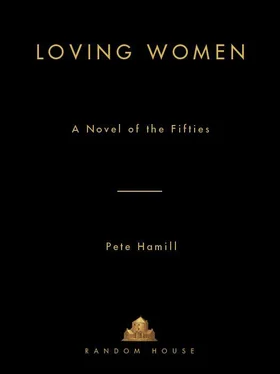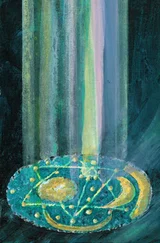“Fuck him ,” he said, and then hurried back to the jeep without a word and drove away.
It is morning on the Gulf and I’m at the window in a bathrobe I bought in Tokyo, staring out at the gray ocean. A storm is coming. There are some young people on the beach, spreading a blanket in defiance of the message from the sky. One is a girl in a flowery bikini, with long legs and beautiful breasts. A boy makes a fuss over her. I am sure he wants her to stay with him forever. But they each have a half century ahead of them now, full of perils and temptations. To survive at all is difficult enough. To run the course together will require a miracle. When they are my age I will be dead, and I wish I could go down there and tell them one sentence that they could carry as a talisman. Words so clean and perfect that they would protect those kids from all danger. But nothing comes. One couple runs into the surf. The girl in the bikini touches the boy’s face and he moves forward clumsily to kiss her cheek. It’s the morning of their lives. And then the sentence forms itself: Watch it .
I dress slowly, and move again into that first morning at Ellyson Field, when I awoke feeling drugged, my mouth sour, my bones rubbery after two hours sleep. I hear the sounds of all Navy mornings: shouts of reveille, reveille , groans of protest, and drop yore cocks and grab yore socks . And over and over, the slamming of those locker doors.
Then I was up, nodding at strangers, saying nothing, stretching and squatting to force some bone or muscle into my body. I showered and dried myself, the floor of the head wet and slippery and men at the sinks scraping at beards. They rubbed their faces, their skin, their bellies as if they were mad at their own flesh. Some hummed tunes, others grumbled in solitude. Some were tattooed. Many were matted with hair. I am sure I dressed in the uniform of the day: dungarees, black shoes, white hat. I am sure I made my bed, and felt ready for the challenge of the morning.
Then a short sunburnt muscle-bound man came over. His nose was peeling and he grinned in a crooked way.
“You’re from New York, I hear.”
“Yeah. Brooklyn.”
“I’m Max Pilsner. The East Side. You goin’ to chow?”
It was as easy as that. A hello in the morning and I had a friend. I don’t make new friends anymore. There have been too many fakers, too many disappointments, and too many real friends have died. Max Pilsner was my friend, and it is a measure of how far we’ve traveled that I no longer know if he is dead or alive. That morning, Max stepped out before me into the steamy Florida air. His arms hung straight from his shoulders. His waist was narrow. And he walked in a series of rolling movements, like gears shifting. He made walking seem like a brilliant performance. All around us, sailors hurried along in the half darkness, their cigarettes bobbing like fireflies. We walked beyond the Supply Shack to the chow hall, where the smell of toast and hash filled the air. Max told me he was a mechanic in Hangar Three, and had come here straight from mechanics school in Memphis and he was hoping for sea duty, anything, to get out of Ellyson Field.
“I’d even join the Fleet Marines,” he said. “And they’re fighting in Korea. The medics, anyway …”
The only good thing about Ellyson was that there were some decent guys here, he said, New Yorkers and shitkickers. “They’re all nuts.” He was telling me this as we waited on line under the eaves along the side of the chow hall. We passed a single piece of graffiti: Find it hard getting up in the morning? Slam a window on it . Through the window, I could see Waleski sitting with other sailors at one of the long wooden tables. Freddie Harada was with two other Orientals. The morning sounds were louder now: metal trays, silverware clattering against metal, cups clunking, coffee urns hissing, guys on KP yelling at one another in the steam, all mixed up with the sound of helicopters beating their way through the morning air.
“Who’s this Bobby Bolden?”
“The best,” Max said. “Greatest horn player in the Navy. Maybe in the whole friggin South. Now that’s a guy that was in the Fleet Marines. A medic. He got wounded, too, in Korea. Won a bunch of medals. Know what’s great about him? He doesn’t give a shit. Nobody can scare him. Nobody. So nobody bothers him. Bobby Bolden …”
He showed me the apartment above the mess hall, where Bobby Bolden lived with all the other Negro sailors, most of them mess cooks. And he pointed out a chief petty officer named Francis Xavier McDaid, standing near the door in starched suntans. Red Cannon was bad enough, Max said, one of those Old Salts who remembered when men were men and ships were wood, but McDaid was Red’s boss and infinitely worse. We had our trays full of scrambled eggs and bacon now. I looked at the chief. He had a broad flat face and a deep tan. He seemed to be staring right at me. I wondered whether Red Cannon had told him about me. Put me in some New York Wise Guy category. We sat down. I turned to look at the door. And saw a black man coming in, powerfully built, with coffee-colored skin. Even from the distance, I could see that he had green eyes. Max told me that this was Bobby Bolden.
“He’s only got one major problem,” he said. “Pussy.”
“Isn’t that everybody’s problem?”
“White pussy.”
I was eating quickly now. Max looked at me.
“That bother you?” Max said.
“I don’t know,” I said. “I never thought about it before.”
“Down here, they lynch colored guys for it. Maybe that’ll help you think about it.”
“Come on, they don’t lynch people anymore, do they?”
“Only when they catch them.”
Bobby Bolden passed through the line like some visiting prince. The black mess cooks cracked wise with him, heaped his tray with food. Then Bolden walked past us down the aisle, nodding at Max, and sat among a group of whites, without saying a word to any of them.
“See what I mean? There’s empty tables all over, but he sits with the worst rednecks on the base. Just to break their balls. Now watch.”
Without finishing their breakfasts, five men got up and left the table. Three of them moved to other tables. Two walked right out of the chow hall. Bobby Bolden showed no emotion. He just sat there eating.
“Does he have one white girl? Or a bunch of them?”
“I don’t know,” Max said, “I don’t follow him around. I’m allergic to gunshots.” He smiled. “But there’s a Wave who works out at Mainside, I know he’s got her . A real good broad, very funny. Not my type, understand? But truly tremendous tits.”
I laughed. “I guess you can’t blame him then.”
“I can blame him for being stupid,” Max said. “Down here, they kill colored guys for lookin ’ at white broads.”
I sipped my coffee. It tasted brackish. I said, “You tell him that?”
“Hey, how you gonna tell him? What do I do? Go up to the guy and say, ‘Hey, Bobby, you’re a nigger , you know? And they have segregation down here. So it ain’t safe for you to be screwing a white broad.’ I mean, Bobby Bolden was a hero in Korea, two Purple Hearts, two Bronze Stars, a whole shitload of other medals. How am I gonna tell him what to do?” He glanced around the hall. “Besides, he just don’t give a shit.”
I looked down at Bobby Bolden again, remembering the sound of the horn. A human being playing the blues on a bright lonesome New Year’s afternoon. Telling everybody who’d listen about the boulevard of broken dreams. He ate slowly and deliberately, in what seemed to be permanent solitude.
Читать дальше












